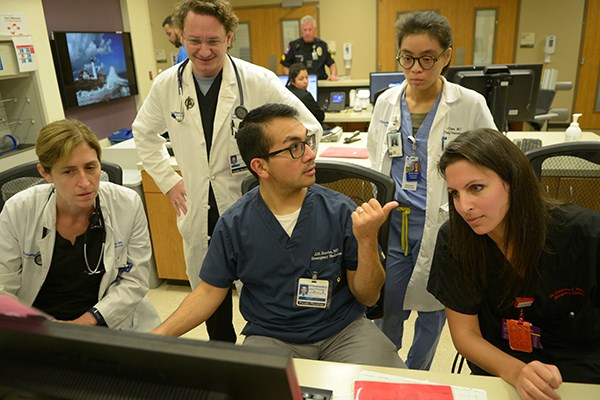Have you ever been on a shift in the ED and thought, “My brain hurts,” or, “If I put one more detail in my brain, it may explode?”
Emergency medicine requires synthesizing large amounts of data in a short amount of time for multiple patients. Think of a busy post-overnight sign-out, when multiple patient-care plans need to be safely communicated from one team to the other. Why are these handoffs so difficult? Is there some theory that may illuminate this phenomenon and provide ways to improve it?
What is Cognitive Load Theory?
Cognitive load theory (CLT) was developed in the 1980s from research in cognitive psychology. Much of the research in CLT involves working memory, which is the memory required for operating a current task. Working memory holds information for a few seconds. Almost all information in your working memory is lost after 20 seconds unless the information is rehearsed. This type of memory is limited and can hold no more than 5–9 information elements (think of memorizing a phone number, ie, 7+/-2). Working memory is critical to completing a successful handoff, but it can be easily overwhelmed.
Working memory is impacted by 3 different types of cognitive load:
- Intrinsic load: the load associated with performing the task itself, such as communicating the names, comorbidities, and plans for patients at sign-out. The goal in a handoff is to manage intrinsic load.
- Extraneous load: the load associated with non-essential aspects of the task, such as what is happening in the environment at sign-out or what is happening in someone’s personal life. The goal in a handoff is to reduce extraneous load.
- Germane load: the load associated with synthesizing the information gathered and developing long-term memories. The goal in a handoff is to optimize germane load.
Strategies to Manage Intrinsic Load in the ED
Handoff Reducing the number of information elements decreases intrinsic load. For example, learning about 20 patients and their comorbidities during sign-out causes a greater load than learning about 10 patients. In the ED, it is difficult to control the number of patients requiring sign-out. However, discharging individuals prior to sign-out and listing only the critical comorbidities for each patient when signing out will reduce information elements and thus reduce cognitive load.
Setting an appropriate amount of time for the handoff reduces intrinsic load. For example, rapid handoff and decision-making consumes more working memory than a handoff allotted adequate time to access necessary patient information. Again, this is difficult to control in the ED, but allowing sufficient time for sign-out is key.
Reducing element interactivity, or how information elements interact with each other, reduces intrinsic load. The more the elements interact, the greater the intrinsic load. The goal, then, during handoff is to attempt to limit uncertainty and give contingencies. For example, one could say, “If the RUQ US is normal, I would then consider PE as the cause of the patient’s pleuritic pain and send a dimer.”
Strategies to Reduce Extraneous Load in the ED Handoff
Minimizing interruptions during sign-out reduces extraneous load. It is difficult to control the physical environment and distractions in the ED, but a culture of limited interruptions during handoffs decreases this cognitive load.
Minimize personal distractions during handoffs as well. Trying to avoid stressful emails before shift or turning off personal phones during sign-out are examples of how to reduce this load.
Strategies to Optimize Germane Load in the ED Handoff
Asking clarifying questions and summarizing data optimizes germane load by rehearsing and synthesizing information. Thus, encouraging clarifying questions during handoff would be a strategy for improvement. Additionally, having the incoming physician repeat a summary at the end of sign-out may also prove useful.
Conclusion
Cognitive load theory gives a framework for illuminating why handoffs can be challenging in the ED. Working memory is the memory utilized during handoffs. Working memory is limited and influenced by intrinsic, extrinsic, and germane cognitive loads. By implementing strategies to manage intrinsic load, reduce extraneous load, and optimize germane load, ED physicians can create more successful handoffs.
For more advice on effective patient handoffs, watch “Transitions of Care,” a video collaboration between EMRA, CORD, CDEM, and SAEM.
References
1. Paas F, Van Merriënboer J. The efficiency of instructional conditions: An approach to combine mental effort and performance measures. Human Factors. 1993;35(4):737–743.
2. Patterson ES, Roth EM, Woods DD, et al. Handoff strategies in settings with high consequences for failure: Lessons for health care operations. Int J Qual Health Care. 2004;16(2):125–32.
3. Sweller J . Cognitive load during problem solving: Effects on learning. Cognitive Science. 1988;12(2):257–285.
4. Van Merriënboer JJ, Sweller J. Cognitive load theory in health professional education: design principles and strategies. Med Educ. 2010;44(1):85-93.
5. Wilson EA, Wolf MS. Working memory and the design of health materials: a cognitive factors perspective. Patient Educ Couns. 2009;74(3):318-22.
6. Young JQ, O'Sullivan PS, Ruddick V, et al. Improving handoffs curricula: Instructional techniques from cognitive load theory. Acad Med. 2017;92(5):719.
7. Young JQ, Ten Cate O, O'Sullivan PS, et al. Unpacking the complexity of patient handoffs through the lens of cognitive load theory. Teach Learn Med. 2016;28(1):88-96.
8. Young JQ, Van Merrienboer J, Durning S, et al. Cognitive load theory: implications for medical education. Med Teach. 2014;36(5):371-84.



